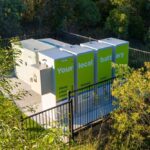Introduction
Power plants are a crucial part of the energy infrastructure, and optimizing their efficiency is essential for sustainability. With increasing demands for energy and environmental concerns, power plants need to operate at optimal levels to reduce emissions and lower energy costs. In this article, we will discuss strategies for optimizing power plant efficiency, focusing on ways to improve performance, reduce energy consumption, and decrease environmental impact.
Understanding Power Plant Efficiency
Power plant efficiency is measured by its ability to convert raw fuel into usable electricity. Factors such as fuel quality, temperature, and moisture can affect efficiency, as can equipment design and maintenance. A well-designed power plant can achieve high efficiency levels, but even minor adjustments can make a significant impact.
Factors Affecting Efficiency
The following factors can impact power plant efficiency:
* Fuel type and quality
* Cooling system design and operation
* Turbine and generator performance
* Control systems and automation
* Maintenance and repair schedules
Strategies for Optimizing Power Plant Efficiency
Optimizing power plant efficiency requires a combination of advanced technologies, maintenance, and operational strategies. The following strategies can help achieve sustainable and efficient power plant operation:
Upgrade and Modernize
Upgrading and modernizing power plant equipment can significantly improve efficiency. This includes:
* Replacing old or outdated turbines and generators with new, more efficient models
* Installing advanced control systems and automation
* Improving cooling system design and operation
Advanced Technologies
Advanced technologies can help optimize power plant efficiency. These include:
* Supercritical carbon dioxide (s-CO2) cycles, which can increase efficiency by up to 15%
* Advanced combustion systems, such as pulverized coal and gas turbines
* High-temperature superconducting (HTS) materials, which can improve efficiency and reduce costs
Maintenance and Repair
Regular maintenance and repair are essential for optimal power plant efficiency. This includes:
* Scheduling regular maintenance and repair cycles
* Implementing predictive maintenance and condition monitoring
* Improving operator training and knowledge
Benefits of Optimized Power Plant Efficiency
Optimizing power plant efficiency offers numerous benefits, including:
Reduced Emissions
Efficient power plants can reduce emissions by up to 50%, contributing to a cleaner environment and better air quality.
Lower Energy Costs
Optimized power plants can reduce energy costs by up to 15%, making them more competitive and sustainable.
Increased Reliability
Improved maintenance and repair schedules can increase power plant reliability, reducing downtime and improving overall performance.
Challenges and Limitations
Despite the benefits of optimized power plant efficiency, there are challenges and limitations to consider:
Higher Initial Costs
Upgrading and modernizing power plant equipment can be expensive, requiring significant initial investments.
Operational Complexity
Advanced technologies and control systems can be complex and require specialized knowledge and training.
Sustainability Concerns
The focus on efficiency and sustainability can lead to concerns about energy security and the reliability of renewable energy sources.
Conclusion
Optimizing power plant efficiency is essential for sustainability, reducing emissions, and lowering energy costs. By understanding the factors affecting efficiency and implementing advanced technologies, maintenance, and operational strategies, power plants can achieve optimal performance. While there are challenges and limitations to consider, the benefits of optimized power plant efficiency make it a worthwhile investment for a sustainable energy future.
FAQs
Q: What is the current state of power plant efficiency?
A: The current state of power plant efficiency varies widely depending on the type and age of the plant, as well as the region in which it operates. According to the International Energy Agency (IEA), the average efficiency of fossil fuel-based power plants is around 33-35%, while renewable energy sources typically have higher efficiency rates.
Q: What are the most efficient power plant technologies?
A: Some of the most efficient power plant technologies include advanced coal and gas turbines, as well as renewable energy sources such as solar and wind power. Supercritical carbon dioxide (s-CO2) cycles are also showing promising efficiency levels.
Q: How can I reduce energy consumption in my power plant?
A: Reducing energy consumption in power plants can be achieved through a combination of measures, including upgrading and modernizing equipment, implementing advanced technologies, and improving operational and maintenance practices.


.png?w=150&resize=150,150&ssl=1)
.png?w=150&resize=150,150&ssl=1)



.png?w=150&resize=150,150&ssl=1)